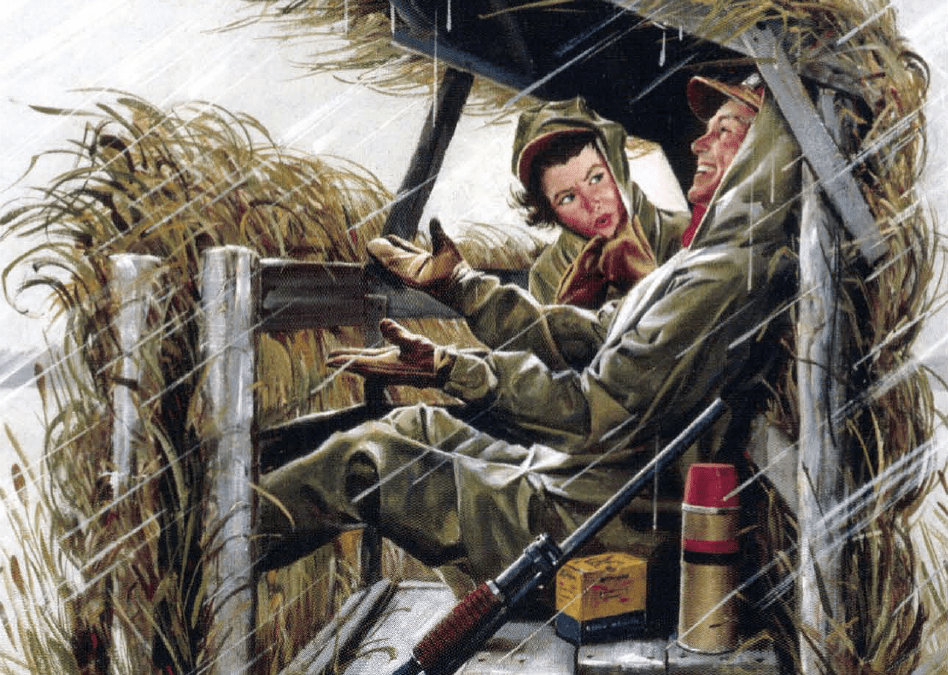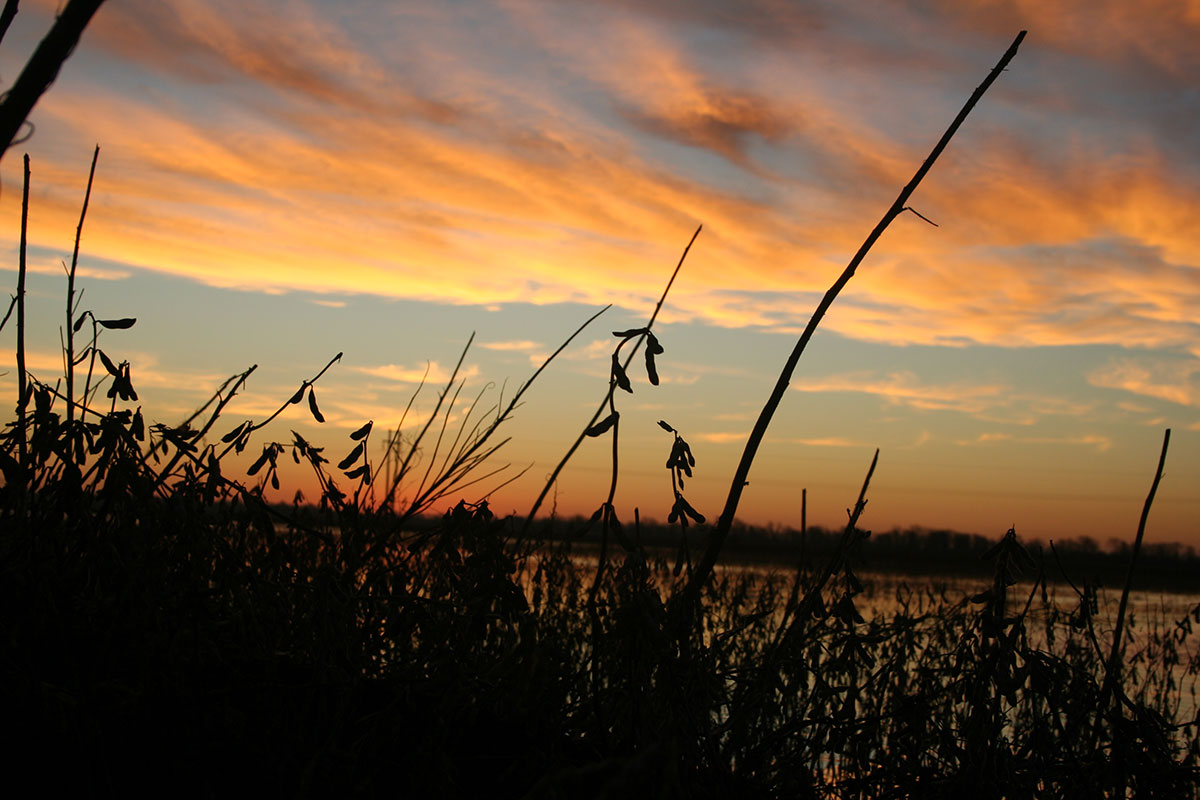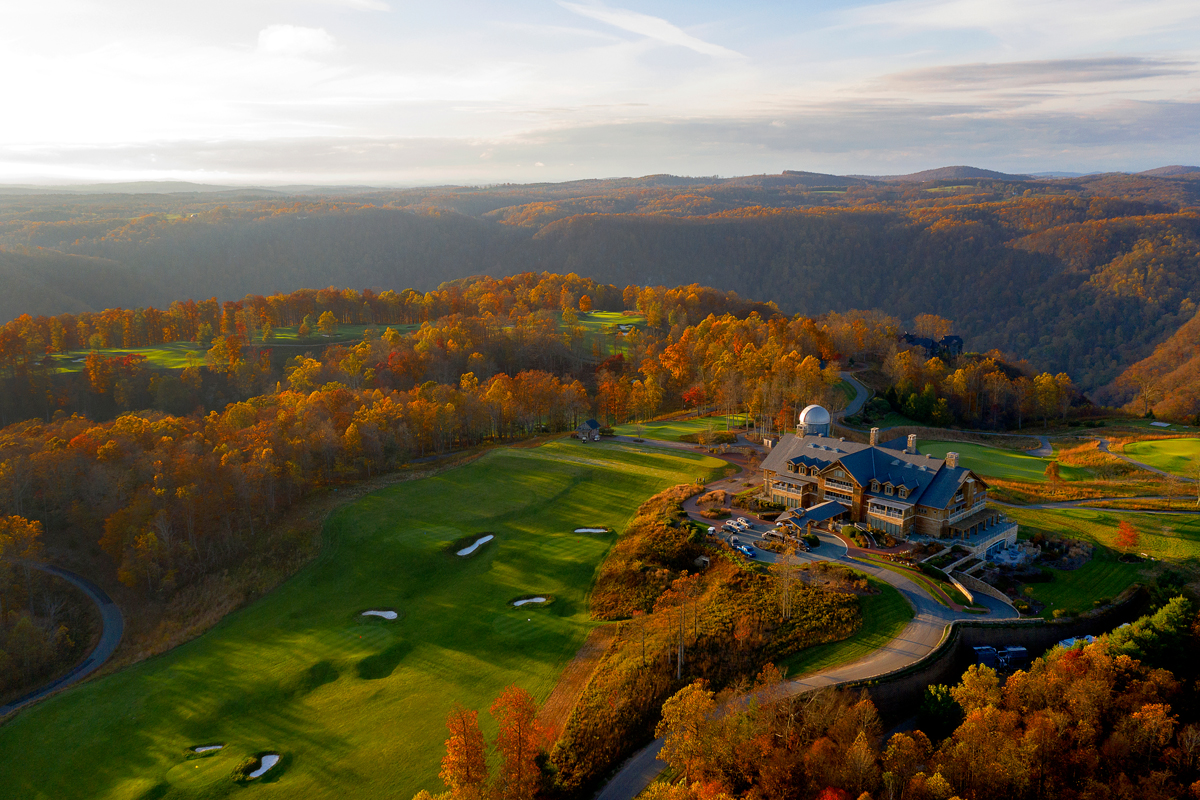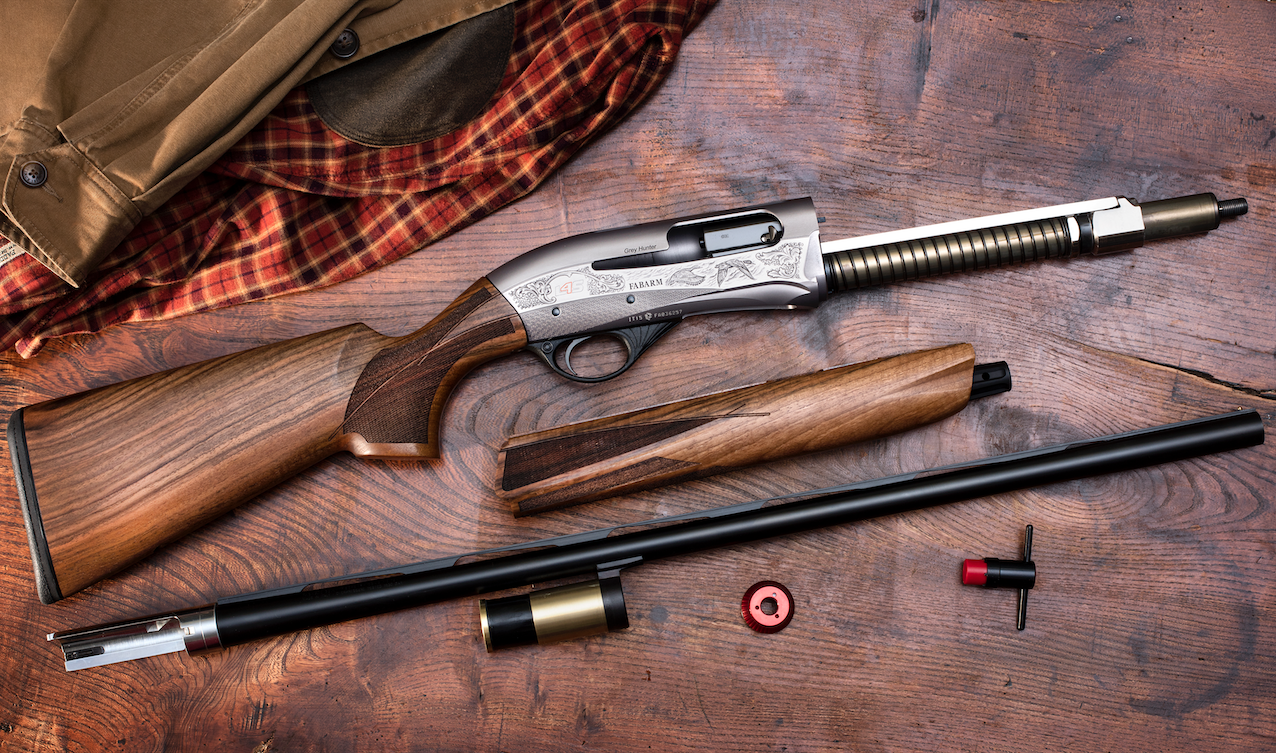She was a great Nordic beauty, and she came with a duck lease.
She was a green-eyed freckle-faced redhead, long of hair and limb, married a couple of times before I met her but neither lasted too long. Her name, literally translated, meant “the daughter of an angel of bright shining light,” and it was true, mostly. She was a banshee in bed and she came with a duck lease.
Way up in Minnesota, a good long time ago, where I tore up my truck on the way to Alaska and tarried a spell, where land was a hundred bucks an acre, Buckhorn long-necks three bucks a case, and the marijuana grew higher than the corn. When the aurora popped and rolled, when the lakes rumbled and the pheromones crackled, otherwise pure Lutheran girls would cruise gravel roads in their rattley old four-wheel drives, sucking cherry Skoal and nipping orange schnapps, looking for a man with rolling papers and a big woodpile. Just leave the porch light on. And if you got real lucky, you might get fresh-baked bread in the morning.
She was a great Nordic beauty, but I told you that already. We were simultaneously and recently single in a very small town way out on the edge of the world, and we made the best of our slim pickings. But I should hardly complain. Back in the ’50s her pappy pitched in with the vet and the bait-shop man to buy a rocky point on a lake I will call Little Windy. When they eventually lost enthusiasm for hip boots and cold water, the rights got passed down the generations.
Did I mention that she was a wingshooter? I bought her a 20-gauge pump, an over-and-under 28, and a Marlin .44 lever gun when we turned our attention to filling the freezer. It was perfect, damn near.
We hammered the birds late one November, the sleet blowing sideways and the little ice beads on the point of each cane rattling against the old Alumacraft, sounding like hail stones on a tin roof.
“Birds mark left, Carrot,” I said. My mustache was freezing to my bottom lip. My toes felt like they had a vise-grip on each one…Lordy for cold. Tail end of the season and the ringbills were on the wind, Canadian birds that had never seen man or decoy, redheaded woman either. They roared low over our blocks with a noise like ripping canvas.
“You don’t mind me calling you Carrot, do you?”
She grinned. Her hat was run down low over her eves but sleet stuck to her eyelashes anyway. “You call me whatever you want,” she said. “Just call me.”
She was deadly with a crossing right-to-left shot, and she neatly folded the last bird. Likely shooting at the first, but I kept mum. One hell of a shot, no matter what. The birds screamed down the wind to the southeast corner of Little Windy, wheeled and banked before the birch and aspen treeline, came back to the blocks with their feet hanging, White Powder Wonder two-piece shotshell box perfect.
“Get down, get down,” she said.
Get down hell! “I’m all for vimen’s rights” my Swede neighbor once confided, “’til dey start telling me vere to poot it. Den dat’s going too far.”
I briefly concurred but there was scant time for philosophy. Those birds would have decoyed to a marching brass band playing “Dixie.” But they never played “Dixie” way up there, a damn shame. And I will get to that by and by.
No time to stuff another shell, she missed one bird, tagged another and clicked on a third. I was shooting a Model 12 modified choke, circa 1956, ounce and an eighth copper-washed number fives, absolutely deadly on pheasants or decoying ducks, way before the lead shot ban.
Flock after flock, raining ducks. Dead birds in the canes, aground on ice-rind, blown clean to the far end of Little Windy, a ten-bird limit in those days and no reason to stretch the law.
“Let’s pick up and go find us a fire,” I said. I’d stuffed the stove with green oak before dawn and it should still be making heat.
She worked the oars and I snagged the blocks. Decoy strings froze fast to my gloves. We switched places when I could no longer use my fingers, and we found all the birds but one. That felt good but the fire felt better, and the whiskey worked wonders.
The storm blew on through about midnight, the wind dropped off to nothing, the skies cleared and the shimmering bright starry array told me it had turned damned cold. Mid-morning, we went to fetch home the skiff and decoys and found Little Windy frozen. Not just frozen, mind you, but it had frozen literally in our wake and we never even knew.
The scant bow wave, the water rippling astern, every oar-stroke swirl was captured in opaque ice and would remain that way even if buried in snow, until thaw, a testament to a fine duck shoot in a day long gone. It was already thick enough to support a red fox, paw prints crossing and crisscrossing, worrying the cattail edge, nosing for cripples and our one lost bird.
Though I lived in a log cabin, cooked on a wood range, threw in with the Lutherans, ate a buffalo I shot out of the Black Hills herd, and even slept beneath its robe, I would never be more than a southern freak to those Norwegians, and among the Swedes, I was even more suspect. So when my blood kin called me back to Carolina, I went, washing ashore on a lovely little island, remote and sparsely settled. I brought the redhead but it did not work as I had hoped.
Norwegians are a perpetually homesick tribe. Starved out of their native land, they took to the sea and took up homesteads on foreign soil, a one-way trip and they knew it, so poor they would never see the fjords again. They ate potato flatbread and lye-cured cod every Christmas for the next hundred years, long after their cousins in the Old Country gave up on both for ample reasons. They prayed in Norwegian in their clapboard country churches, and though they understood little, they hoped the Good Lord would hear it all. The hardest-bitten, shoot-it-in-the-head-and-cut their-throats hog killing, rock rolling, dry-land wheat farmer would break down and weep if he heard “The Hills of Home” in the Old Tongue.
So I reckoned I did her a favor when I drove her to Savannah and put her on that northbound plane, though she did not think so at the time. I stood in the jet-way and watched her go, from eyebrows to toes most perfect. But from the eyebrows to the red hair…alas. She bought the ticket on her card, a thousand bucks at the last minute. She did not look back, and she walked out of my life just like that, like the snap of the closing of a very fine gun.
But not quite.
My boy was still up there and he buddied up with the bait shop man’s grandson and took up with the redhead’s niece, for a while, anyway. He called me the evening of the close of deer season, my birthday that year.
“Happy birthday, Pa.”
“Thanks, Sonny. How you been?”
“Pretty good. I killed a real nice buck today.”
It wasn’t his first buck and we always passed a joke back and forth.
“Where’d you get him?”
But this time, instead of saying “Between an oak and a birch,” he said, “Busted him out of the cattails on Little Windy, right where you used to stash the boat. I figured you’d appreciate that.”
I did.
And so another generation came to Little Windy.
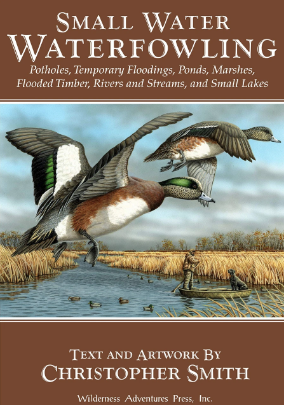 When it comes to actually shooting ducks and geese over water, the action is on the small places – the inland lakes, the ponds and potholes, the floodings and creeks and backwaters. Day in and day out, that’s where the ducks are, and that’s where Chris Smith takes you.
When it comes to actually shooting ducks and geese over water, the action is on the small places – the inland lakes, the ponds and potholes, the floodings and creeks and backwaters. Day in and day out, that’s where the ducks are, and that’s where Chris Smith takes you.
However, each of these places requires a separate technique, alternate decoys spreads and calling concepts, and different gear to use. He tells you how to approach each type of hunting for the weather and conditions. He knows when and when not to call. He describes the skills a good waterfowl dog needs to know for each place, things he’s taught his succession of Labrador retrievers over the years. Buy Now

